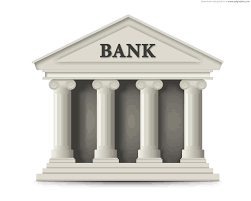bank
英 [bæŋk]
美 [bæŋk]
- n. 银行;岸;浅滩;储库
- vt. 将…存入银行;倾斜转弯
- vi. 堆积;倾斜转弯
- n. (Bank)人名;(英、德、俄)班克;(法、匈)邦克
使用频率:

记忆方法
将“bank”与“b-a-n-k”(银行)直接关联,想象自己在一家银行的柜台前,即“b”(boring,无聊的,让人联想到银行常常是静态的)- “a”(像银行的字母A,或联想到account,账户)- “n”(像数字1,暗示银行的存款账户)- “k”(类似英文中“key”,想象银行门锁的钥匙)。这样的联想有助于记忆“bank”意为银行。
以上内容由AI生成, 仅供参考和借鉴
中文词源
bank 银行,堤岸
词源同bench,长凳,原指土凳,堤岸。银行义来自14世纪意大利威尼斯商人在市场摆一条凳子从事货币存储及放贷业务, 也即现代银行的起源。
英语词源
- bank
-
bank: [12] The various disparate meanings of modern English bank all come ultimately from the same source, Germanic *bangk-, but they have taken different routes to reach us. Earliest to arrive was ‘ridge, mound, bordering slope’, which came via a hypothetical Old Norse *banki. Then came ‘bench’ [13] (now obsolete except in the sense ‘series of rows or tiers’ – as in a typewriter’s bank of keys); this arrived from Old French banc, which was originally borrowed from Germanic *bangk- (also the source of English bench).
Finally came ‘moneylender’s counter’ [15], whose source was either French banque or Italian banca – both in any case deriving ultimately once again from Germanic *bangk-. The current sense, ‘place where money is kept’, developed in the 17th century. The derived bankrupt [16] comes originally from Italian banca rotta, literally ‘broken counter’ (rotta is related to English bereave and rupture); in early times a broken counter or bench was symbolic of an insolvent moneylender.
The diminutive of Old French banc was banquet ‘little bench’ (perhaps modelled on Italian banchetto), from which English gets banquet [15]. It has undergone a complete reversal in meaning over the centuries; originally it signified a ‘small snack eaten while seated on a bench (rather than at table)’.
=> bench - bank (n.1)
- "financial institution," late 15c., from either Old Italian banca or Middle French banque (itself from the Italian word), both meaning "table" (the notion is of the moneylender's exchange table), from a Germanic source (compare Old High German bank "bench"); see bank (n.2).
Bank holiday is from 1871, though the tradition is as old as the Bank of England. To cry all the way to the bank was coined 1956 by flamboyant pianist Liberace, after a Madison Square Garden concert that was packed with patrons but panned by critics. - bank (n.2)
- "earthen incline, edge of a river," c. 1200, probably in Old English but not attested in surviving documents, from a Scandinavian source such as Old Norse banki, Old Danish banke "sandbank," from Proto-Germanic *bangkon "slope," cognate with *bankiz "shelf" (see bench (n.)).
- bank (v.)
- "to act as a banker," 1727, from bank (n.1). As "to deposit in a bank" from 1833. Figurative sense of "to rely on" (i.e. "to put money on") is from 1884, U.S. colloquial. Meaning "to ascend," as of an incline, is from 1892. In aeronautics, from 1911. Related: Banked; banking.
权威例句
- 1. We beached the canoe, running it right up the bank.
- 我们把独木舟径直划到岸边,并拖上岸。
- 2. They siphon foreign aid money into their personal bank accounts.
- 他们把国外救济金非法转入了个人银行账户。
- 3. Investigators say nearly $100,000 was wired into the suspect's bank accounts.
- 调查人员说有近10万美元汇入了嫌疑人的银行账户。
- 4. The bank yesterday revealed a 30 per cent nosedive in profits.
- 该银行昨天透露其利润骤降30%。
- 5. Bank robberies, burglaries and muggings are reported almost daily in the press.
- 报纸上几乎每天都有抢劫银行、入室行窃和拦路抢劫的报道。